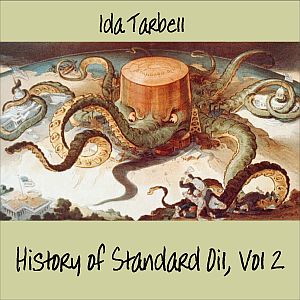An Inquiry into the Nature and Causes of the Wealth of Nations is the magnum opus of the Scottish economist Adam Smith, published on March 9, 1776 during the Scottish Enlightenment. It is a clearly written account of political economy at the dawn of the Industrial Revolution, and is widely considered to be the first modern work in the field of economics. (from Wikipedia)
23 episodes
A clear boundary exists between the servile and the non-servile condition of labour, and the conditions upon either side of that boundary utterly differ one from another, Where there is compulsion applicable by positive law to men of a certain status, such compulsion enforced in the last resort by the powers at the disposal of the State, there is the institution of Slavery ; and if that institution be sufficiently expanded the whole State may be said to repose upon a servile basis, and is a Servile State.
(Hilaire Belloc)
18 episodes
Jack London lived for a time within the grim and grimy world of the East End of London, where half a million people scraped together hardly enough on which to survive. Even if they were able to work, they were paid only enough to allow them a pitiful existence. He grew to know and empathise with these forgotten (or ignored) people as he spoke with them and tasted the workhouse, life on the streets, ... and the food, which was cheap, barely nutritious, and foul.
He writes about his experiences in a fluid and narrative style, making it very clear what he thinks of the social structures which created the Abyss, and of the millionaires who live high on the labours of a people forced to live in squalor. "... The food this managing class eats, the wine it drinks, ... the fine clothes it wears, are challenged by eight million mouths which have never had enough to fill them, and by twice eight million bodies which have never been sufficiently clothed and housed."
(Summary by Peter Yearsley)
27 episodes

Other People's Money and How the Bankers Use It is a collection of essays written by Louis Brandeis published as a book in 1914. The book attacked the use of investment funds to promote the consolidation of various industries under the control of a small number of corporations, which Brandeis alleged were working in concert to prevent competition. Brandeis harshly criticized investment bankers who controlled large amounts of money deposited in their banks by middle-class people. The heads of these banks, Brandeis pointed out, routinely sat on the boards of railroad companies and large industrial manufacturers of various products, and routinely directed the resources of their banks to promote the interests of their own companies. These companies, in turn, sought to maintain control of their industries by crushing small businesses and stamping out innovators who developed better products to compete against them.
Brandeis supported his contentions with a discussion of the actual dollar amounts -- in millions of dollars -- controlled by specific banks, industries, and industrialists such as J. P. Morgan, noting that these interests had recently acquired a far larger proportion of American wealth than corporate entities had ever had before. He extensively cited testimony from a Congressional investigation performed by the Pujo Committee, named after Louisiana Representative Arsène Pujo, into self-serving and monopolistic business dealing.
The book received great publicity at the time, and was widely lauded by legal academics. Attention to the book was amplified by Brandeis' nomination to the Supreme Court of the United States in 1916.(Summary by Wikipedia)
10 episodes
The History of the Standard Oil Company is a book written by journalist Ida Tarbell in 1904. It was an exposé of the Standard Oil Company, run at that time by oil tycoon John D. Rockefeller, the richest figure in America's history. Originally serialized in 19 parts in McClure's magazine, the book was a seminal example of muckraking, and inspired many other journalists to write about trusts, large businesses that (in the absence of strong antitrust law in the 19th century) attempted to gain monopolies in various industries. The History of the Standard Oil Company was credited with hastening the breakup of Standard Oil, which came about in 1911. ( Summary by Wikipedia )Note: This reading does not include any of the Appendices.
13 episodes

Social Statics, or The Conditions essential to Happiness specified, and the First of them Developed is an 1851 book by the British polymath Herbert Spencer. In it, he uses the term "fitness" in applying his ideas of Lamarckian evolution to society, saying for example that "It is clear that any being whose constitution is to be moulded into fitness for new conditions of existence must be placed under those conditions. Or, putting the proposition specifically — it is clear that man can become adapted to the social state, only by being retained in the social state. This granted, it follows that as man has been, and is still, deficient in those feelings which, by dictating just conduct, prevent the perpetual antagonism of individuals and their consequent disunion, some artificial agency is required by which their union may be maintained. Only by the process of adaptation itself can be produced that character which makes social equilibrium spontaneous."
Despite its commonly being attributed to this book, it was not until his Principles of Biology of 1864 that Spencer coined the phrase "survival of the fittest", which he would later apply to economics and biology. This was a key tenet of so-called Social Darwinism.
Economist Murray Rothbard called Social Statics "the greatest single work of libertarian political philosophy ever written. (Wikipedia)
40 episodes
Eryxias (ΕΡΥΞΙΑΣ) may not have been written by Plato (ΠΛΑΤΩΝ). The dialogue discusses whether wealth has value and what the aim of philosophy should be. (Summary by Geoffrey Edwards)
1 episodes
The Principles of Political Economy, first published in 1848, was one of the most important texts on the subject of economy at that time. It is broken up into five books; Production, Distribution, Exchange, Influence of the Progress of Society on Production and Influence of Government.
This version is an abridged text book edited by J. Laurence Laughlin, and was used at the college level.
(Summary by Ann Boulais)
56 episodes
"The Challenge of Waste" examines the wasteful nature of the competitive market system, particularly from a Veblenian point of view. He also praises World War I era planning by the Fuel Administration and other government wartime agencies. (Summary by progressingamerica)
20 episodes
In 1908, the National Monetary Commission was established by Congress to study financial boom-and-bust cycles. Senator Nelson Aldrich (Republican-RI) was chair of the commission. He, in secret enclave with a group of bankers, drafted what was called The Aldrich Plan, which provided for a central "bank" that would hold funds individual banks could borrow in the case of a bank run, print currency, and act as the fiscal agent of the US government. However, the plan gave little power to the government and seemed to give almost absolute control of the country's currency to Wall Street financiers. This 1912 book outlines the dangers and supposed duplicity of The Aldrich Plan while it was being debated in Congress. (The plan was eventually defeated, but was used as a basis for the Federal Reserve Act, which was signed into law in 1913.) - Summary by TriciaG
29 episodes
"When, in the course of human events, it becomes necessary for an author to dissolve the bands which have connected him with his publishers, a decent respect for the opinions of mankind requires that he should declare the causes which impel him to the separation." So begins the alleged author's introduction to this work, which chronicles the conflict between a female author and her publisher. This conflict really did happen, although the details (dates, names, etc.) in this book are fictitious. For more information about the actual situation, see the author's Wikipedia article.
15 episodes
Army Maj. Gen. Smedley Butler's expose of American Corporate Imperialism. Butler said, “I served in all commissioned ranks from second lieutenant to Major General. And during that period I spent most of my time being a high-class muscle man for Big Business, for Wall Street, and for the bankers. In short, I was a racketeer for capitalism. I suspected I was just part of the racket all the time. Now I am sure of it.” - Summary by John Greenman and https://www.americanswhotellthetruth.org/portraits/major-general-smedley-butler
5 episodes

Frédéric Bastiat was an early 19th century French economist/statesman whose common sense essays tried to battle the rise of socialist ideology after the French revolution, where provisional governments were rivaling each other for power. Of central concern was who should control the money. How is wealth created? How should it be divided amongst the people? What services should government provide? Same questions we are asking now. This essay addresses the popular fallacy of the day that Capital should be available to all gratuitiously, without necessity of paying back loans, and looking upon any form of interest as Usury. Bastiat argued that capital is created by savings, and savings are what makes borrowing possible so the common man can get ahead and prosper, and lending is only worth the risk if the lender profits by it, via interest. He demonstrated the law of supply and demand, that, in essence, interest decreases as availability of capital increases. His basic premises is that without a leisure class (people who have money to spare over earning daily bread), there would be nothing to borrow, so that neither the common man nor society can prosper. Translated from the French by Horace White of Chicago. I have divided this essay up into segments for ease of comprehension. - Summary by Michele Fry
7 episodes
“Prosperity, like a house, is a roof over a man’s head, affording him protection and comfort. A roof presupposes a support, and a support necessitates a foundation. The roof of prosperity, then, is supported by the following eight pillars which are cemented in a foundation of moral consistency:
1. Energy
2. Economy
3. Integrity
4. System
5. Sympathy
6. Sincerity
7. Impartiality
8. Self-reliance
A business built up on the faultless practice of all these principles would be so firm and enduring as to be invincible.” - Summary by James Allen
11 episodes













